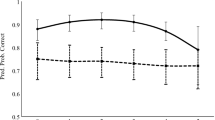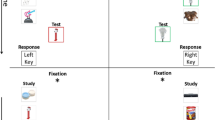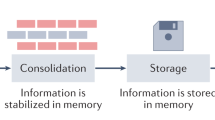Abstract
Mentally reinstating encoding operations at retrieval might improve access to memories; however, such constrained retrieval is an effortful process that may not always be used. The memory-for-foils procedure (Jacoby, Shimizu, Daniels, & Rhodes, Psychonomic Bulletin & Review 12, 852-857, 2005) infers participant-initiated mental reinstatement of encoding operations during attempts at recognition from the differential memory that accrues to foils during a test of deeply processed items versus during a test of shallowly processed items, as indicated by performance on a final recognition memory test for the foils. Experiment 1 tested whether differential memory for foils is due to the evocation of task context during recollection of neighboring old items. Experiment 2 tested whether inducing a set to respond without much effort on a prior recognition test affects the likelihood of constrained retrieval on later tests. Experiment 3 tested whether constrained retrieval is less likely to occur when the deep versus shallow source of test items is intermixed, rather than blocked in separate tests. These experiments provide evidence that people query memory by mentally reinstating encoding operations and identify conditions that affect the probability of constrained retrieval.
Similar content being viewed by others
Notes
We thank an anonymous reviewer for suggesting this analysis.
For the mixed condition, we divided phase 2 into halves and coded phase 3 items according to whether they were presented in the first versus second half of phase 2 (see also Experiment 2). No difference in memory performance across halves was found (p = .14). Neither did participants shift constraints on retrieval across time; that is, no half × depth interaction was found (p = .13).
A similar analysis in Experiment 1 on memory for foils when the difficult test was first versus the easy test found better recognition for deep versus shallow foils when the difficult test was first, F(1, 12) = 21.6, MSE = .12, as well as when the easy test was first, F(1, 11) = 7.98, MSE = .08. Although the difference in memory for foils was numerically greater in the difficult test condition (hits minus false alarms was .70 for deep foils versus .56 for shallow foils, as compared with .58 versus .47 in the easy test condition), the interaction of foil type and initial test difficulty was not significant (F < 1). This test of the interaction has relatively low power, as compared with Experiment 3. However, the substantially greater list length in Experiment 1 may also have led participants to engage in more constrained retrieval, a hypothesis we are currently testing.
References
Alban, M. W. (2010). Controlled retrieval processing among younger adults (Master’s thesis). Retrieved from http://etd.lib.fsu.edu/theses/available/etd-06022010-175843/unrestricted/Alban_M_Thesis_2010.pdf
Bayen, U. J., Murnane, K., & Erdfelder, E. (1996). Source discrimination, item detection, and multinomial models of source monitoring. Journal of Experimental Psychology: Learning, Memory, and Cognition, 22, 197–215.
Benjamin, A. S., & Bawa, S. (2004). Distractor plausibility and criterion placement in recognition. Journal of Memory and Language, 51, 159–172.
Bridger, E. K., Herron, J. E., Elward, R. L., & Wilding, E. L. (2009). Neural correlates of individual differences in strategic retrieval processing. Journal of Experimental Psychology: Learning, Memory, and Cognition, 35, 1175–1186.
Brown, S., Steyvers, M., & Hemmer, P. (2007). Modeling experimentally induced strategy shifts. Psychological Science, 18, 40–45.
Buckner, R. L., Wheeler, M. E., & Sheridan, M. A. (2001). Encoding processes during retrieval tasks. Journal of Cognitive Neuroscience, 13, 406–415.
Burgess, P. W., & Shallice, T. (1996). Confabulation and the control of recollection. Memory, 4, 359–411.
Coltheart, M. (1981). The MRC psycholinguistic database. Quarterly Journal of Experimental Psychology, 33A, 497–505.
Craik, F. I. M. (1977). Depth of processing in recall and recognition. In S. Dormic & P. M. A. Rabbitt (Eds.), Attention and performance VI (pp. 679–697). Hillsdale, NJ: Erlbaum.
Danckert, S. L., MacLeod, C. M., & Fernandes, M. A. (2011). Source-constrained retrieval influences the encoding of new information. Memory & Cognition, 39, 1374–1386.
Davis, O. C., Geller, A. S., Rizzuto, D. S., & Kahana, M. J. (2008). Temporal associative processes revealed by intrusions in paired-associate recall. Psychonomic Bulletin & Review, 15, 64–69.
Dewhurst, S. A., & Brandt, K. R. (2007). Reinstating effortful encoding operations at test enhances episodic remembering. Quarterly Journal of Experimental Psychology, 60, 543–550.
Dewhurst, S. A., & Knott, L. M. (2010). Investigating the encoding-retrieval match in recognition memory: Effects of experimental design, specificity, and retention interval. Memory & Cognition, 38, 1101–1109.
Engelkamp, J., Zimmer, H. D., Mohr, G., & Sellen, O. (1994). Memory of self-performed tasks: Self-performing during recognition. Memory & Cognition, 22, 34–39.
Fisher, R. P., & Craik, F. I. M. (1977). Interaction between encoding and retrieval operations in cued recall. Journal of Experimental Psychology: Human Learning and Memory, 3, 701–711.
Fisher, R. P., & Geiselman, R. E. (1992). Memory-enhancing techniques for investigative interviewing: The cognitive interview. Springfield, IL: Thomas.
Gallo, D. A., Meadow, N. G., Johnson, E. L., & Foster, K. T. (2008). Deep levels of processing elicit a distinctiveness heuristic: Evidence from the criterial recollection task. Journal of Memory and Language, 58, 1095–1111.
Glisky, E. L., & Rabinowitz, J. C. (1985). Enhancing the generation effect through repetition of operations. Journal of Experimental Psychology: Learning, Memory, and Cognition, 11, 193–205.
Halamish, V., Goldsmith, M., & Jacoby, L. L. (2012). Source-constrained recall: Front-end and back-end control of retrieval quality. Journal of Experimental Psychology: Learning, Memory, and Cognition, 38, 1–15
Herron, J. E., & Wilding, E. L. (2006). Neural correlates of control processes engaged before and during recovery of information from episodic memory. NeuroImage, 30, 634–644.
Jacoby, L. L., & Craik, F. I. M. (1979). Effects of elaboration of processing at encoding and retrieval: Trace distinctiveness and recovery of initial context. In L. S. Cermak & F. I. M. Craik (Eds.), Levels of processing in human memory (pp. 1–21). Hillsdale, NJ: Erlbaum.
Jacoby, L. L., Kelley, C. M., & McElree, B. D. (1999). The role of cognitive control: Early selection versus late correction. In S. Chaiken & Y. Trope (Eds.), Dual-process theories in social psychology (pp. 383–400). New York: Guilford.
Jacoby, L. L., Shimizu, Y., Daniels, K. A., & Rhodes, M. G. (2005). Modes of cognitive control in recognition and source memory: Depth of retrieval. Psychonomic Bulletin & Review, 12, 852–857.
Jacoby, L. L., Shimizu, Y., Velanova, K., & Rhodes, M. G. (2005). Age differences in depth of retrieval: Memory for foils. Journal of Memory and Language, 52, 493–504.
Johnson, J. D., & Rugg, M. D. (2006). Electrophysiological correlates of retrieval processing: Effects of consistent versus inconsistent retrieval demands. Journal of Cognitive Neuroscience, 18, 1531–1544.
Kahana, M. J. (1996). Associative retrieval processes in free recall. Memory & Cognition, 24, 103–109.
Marsh, R. L., Meeks, J. T., Cook, G. I., Clark-Foos, A., Hicks, J. L., & Brewer, G. A. (2009). Retrieval constraints on the front end create differences in recollection on a subsequent test. Journal of Memory and Language, 61, 470–479.
McDuff, S. G. R., Frankel, H. C., & Norman, K. A. (2009). Multivoxel pattern analysis reveals increased memory targeting and reduced use of retrieved details during single-agenda source monitoring. Journal of Neuroscience, 29, 508–516.
Morris, C. D., Bransford, J. D., & Franks, J. J. (1977). Levels of processing versus transfer appropriate processing. Journal of Verbal Learning and Verbal Behavior, 16, 519–533.
Moscovitch, M., & Craik, F. I. M. (1976). Depth of processing, retrieval cues, and uniqueness of encoding as factors in recall. Journal of Verbal Learning and Verbal Behavior, 15, 447–458.
Nairne, J. S. (2002). The myth of the encoding-retrieval match. Memory, 10, 389–395.
Nairne, J. S., & Widner, R. L., Jr. (1987). Generation effects with nonwords: The role of test appropriateness. Journal of Experimental Psychology: Learning, Memory, and Cognition, 13, 164–171.
Naveh-Benjamin, M., Keshet Brav, T., & Levy, O. (2007). The associative memory deficit of older adults: The role of strategy utilization. Psychology and Aging, 22, 202–208.
Paxton, J. L., Barch, D. M., Storandt, M., & Braver, T. S. (2006). Effects of environmental support and strategy training on older adults’ use of context. Psychology and Aging, 21, 499–509.
Polyn, S. M., Norman, K. A., & Kahana, M. J. (2009). A context maintenance and retrieval model of organizational processes in free recall. Psychological Review, 116, 129–156.
Rabinowitz, J. C. (1990). Effects of repetition of mental operations on memory for occurrence and origin. Memory & Cognition, 18, 72–82.
Reder, L. M., Donavos, D. K., & Erickson, M. A. (2002). Perceptual match effects in direct tests of memory: The role of contextual fan. Memory & Cognition, 30, 312–323.
Rhodes, M. G., & Castel, A. D. (2008). Memory predictions are influenced by perceptual information: Evidence for metacognitive illusions. Journal of Experimental Psychology: General, 137, 615–625.
Rhodes, M. G., & Jacoby, L. L. (2007a). On the dynamic nature of response criterion in recognition memory: Effects of base rate, awareness, and feedback. Journal of Experimental Psychology: Learning, Memory, and Cognition, 33, 305–320.
Rhodes, M. G., & Jacoby, L. L. (2007b). Toward analyzing cognitive illusions: Past, present, and future. In J. S. Nairne (Ed.), The foundations of remembering: Essays in honor of Henry L. Roediger III (pp. 379–393). New York: Psychology Press.
Rugg, M. D., Allan, K., & Birch, C. S. (2000). Electrophysiological evidence for the modulation of retrieval orientation by depth of study processing. Journal of Cognitive Neuroscience, 12, 664–678.
Rugg, M. D., & Wilding, E. L. (2000). Retrieval processing and episodic memory. Trends in Cognitive Sciences, 4, 108–115.
Sahakyan, L., Delaney, P. F., & Kelley, C. M. (2004). Self-evaluation as a moderating factor of strategy change in directed forgetting benefits. Psychonomic Bulletin & Review, 11, 131–136.
Sahakyan, L., & Kelley, C. M. (2002). A contextual change account of the directed forgetting effect. Journal of Experimental Psychology: Learning, Memory, and Cognition, 28, 1064–1072.
Shimizu, Y., & Jacoby, L. L. (2005). Similarity-guided depth of retrieval: Constraining at the front end. Canadian Journal of Experimental Psychology, 59, 17–21.
Smith, S. M. (1979). Remembering in and out of context. Journal of Experimental Psychology: Human Learning and Memory, 5, 460–471.
Stretch, V., & Wixted, J. T. (1998). On the difference between strength-based and frequency-based mirror effects in recognition memory. Journal of Experimental Psychology: Learning, Memory, and Cognition, 24, 1379–1396.
Velanova, K., Jacoby, L. L., Wheeler, M. E., McAvoy, M. P., Petersen, S. E., & Buckner, R. L. (2003). Functional-anatomic correlates of sustained and transient processing components engaged during controlled retrieval. Journal of Neuroscience, 23, 8460–8470.
Verde, M. F., & Rotello, C. M. (2007). Memory strength and the decision process in recognition memory. Memory & Cognition, 35, 254–262.
Wilding, E. L., & Nobre, A. C. (2001). Task-switching and memory retrieval processing: Electrophysiological evidence. NeuroReport, 12, 3613–3637.
Author Note
Michael W. Alban, Florida State University, Department of Psychology, 1107 W. Call Street, Tallahassee, FL 32306-4301; Colleen M. Kelley, Florida State University, Department of Psychology.
We thank Brett Miller, Elena Zehnder, Ashley Scheurer, and Joshua Russell for assistance with running participants. E-mail concerning this article can be addressed to alban@psy.fsu.edu.
Author information
Authors and Affiliations
Corresponding author
Rights and permissions
About this article
Cite this article
Alban, M.W., Kelley, C.M. Variations in constrained retrieval. Mem Cogn 40, 681–692 (2012). https://doi.org/10.3758/s13421-012-0185-5
Published:
Issue Date:
DOI: https://doi.org/10.3758/s13421-012-0185-5




